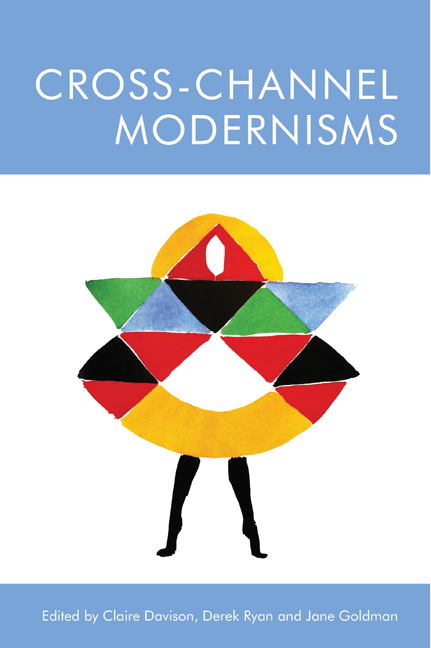Book contents
- Frontmatter
- Contents
- List of Figures
- Notes on Contributors
- Introduction: Cross-Channel (Transmanche) Modernisms
- Interlude: Translating
- 1 On Unknowing French? Rhythm and Le Rythme on a Cross-Channel Exchange
- 2 Impressions of Translation: Ford Madox Ford’s Cosmopolitan Literary Crossings
- 3 Sydney Schiff and Marcel Proust: Table-talk, Tribute, Translation
- Interlude: Fashioning
- 4 Cross-Channel Modernisms and the Vicissitudes of a Laughing Torso: Nina Hamnett, Artist, Bohemian and Writer in London and Paris
- 5 Jean Rhys’s comédie anglaise
- 6 Betray to Become: Departure in James Joyce’s A Portrait of the Artist as a Young Man
- Interlude: Mediating
- 7 Close Up and Cross-Channel Cinema Culture
- 8 Debussy at the Omega Workshops
- 9 Across the Other Channel: Elizabeth Bowen and Modernist Mediation
- Coda: ‘You, who cross the Channel’: Virginia Woolf, Departures and the Spectro-Aesthetics of Modernism 215
- Index
8 - Debussy at the Omega Workshops
Published online by Cambridge University Press: 03 October 2020
- Frontmatter
- Contents
- List of Figures
- Notes on Contributors
- Introduction: Cross-Channel (Transmanche) Modernisms
- Interlude: Translating
- 1 On Unknowing French? Rhythm and Le Rythme on a Cross-Channel Exchange
- 2 Impressions of Translation: Ford Madox Ford’s Cosmopolitan Literary Crossings
- 3 Sydney Schiff and Marcel Proust: Table-talk, Tribute, Translation
- Interlude: Fashioning
- 4 Cross-Channel Modernisms and the Vicissitudes of a Laughing Torso: Nina Hamnett, Artist, Bohemian and Writer in London and Paris
- 5 Jean Rhys’s comédie anglaise
- 6 Betray to Become: Departure in James Joyce’s A Portrait of the Artist as a Young Man
- Interlude: Mediating
- 7 Close Up and Cross-Channel Cinema Culture
- 8 Debussy at the Omega Workshops
- 9 Across the Other Channel: Elizabeth Bowen and Modernist Mediation
- Coda: ‘You, who cross the Channel’: Virginia Woolf, Departures and the Spectro-Aesthetics of Modernism 215
- Index
Summary
‘But who in music has tried to do what Strauss is doing, or Debussy?’ (Woolf 1977: 18). Virginia Woolf's comment in her article for The Times, ‘Impressions at Bayreuth’ from August 1909, is remarkably prescient of a schism in the reception of contemporary music in the United Kingdom between those who championed Richard Strauss, and those who favoured Claude Debussy. Debussy's reputation in Britain had been growing since 1907, the product of enthusiastic programming by Sir Henry Wood and Sir Edgar Speyer, but Woolf's attention to Debussy in 1909 follows the premiere of his opera Pelléas and Mélisande at Covent Garden that year, and two concert visits to Britain by the composer, the first in 1908. Whilst these were not an unreserved success – Victor Segalen recalled Mme Debussy's comments after a rehearsal for La Mer: ‘the sea in lumps’, she complained, dinted by ‘labourious [sic] chewing’ (quoted in Nichols 1992: 219) – the scene was at least prepared for Debussy's reception by a cultured artistic elite, for whom the performance of allied international composers became an increasingly important part of a stance of European solidarity during the First World War.
Woolf's interest in and detailed knowledge of music has been the subject of an authoritative analysis by Emma Sutton in Virginia Woolf and Classical Music (2013), a study which explores Woolf's record of music through her diaries and letters, the role of music for key themes in her novels, and the transposition of musical forms to her own writing. Bloomsbury's engagement with music more generally, however, has had less attention. An appeal for work on this subject in the Charleston Newsletter of 1984 stimulated reminiscences from Barbara Strachey Halpern of music in Oliver Strachey's household, and the activities of passionate Wagnerian Saxon Sydney-Turner. A few months later, a short article considered Duncan Grant's activities as a stage designer, including his commission by the French director Jacques Copeau for designs for a production of Debussy's Pelléas et Mélisande in New York in 1917 (performed 1918), and later commissions in London for the Camargo Ballet. However, the musical – or indeed theatrical – activities of the Omega Workshops are seldom more than mentioned, not least since archival material is scant where one-off live performance events are concerned.
- Type
- Chapter
- Information
- Cross-Channel Modernisms , pp. 184 - 198Publisher: Edinburgh University PressPrint publication year: 2020



